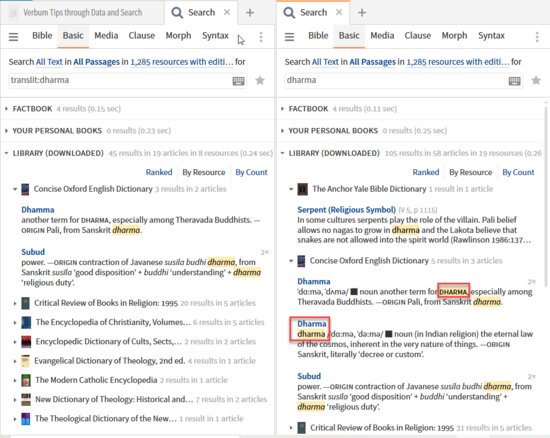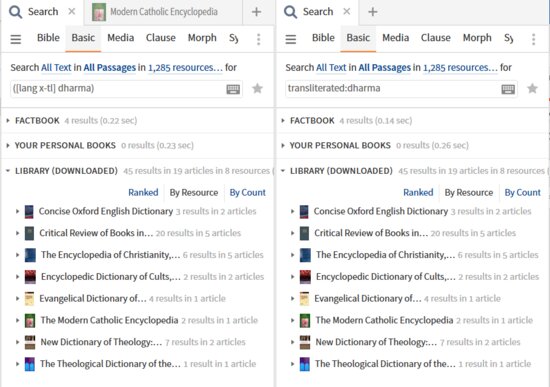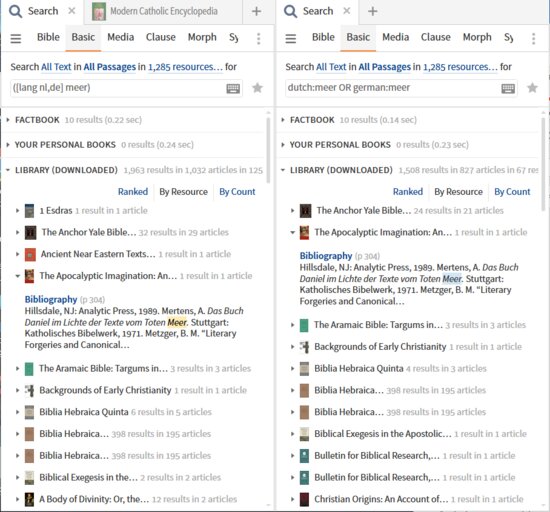Docx files for personal book: Verbum 9 part 1; Verbum 9 part 2; Verbum 9 part 3; Verbum 9 part 4; Verbum 9 part 5; How to use the Verbum Lectionary and Missal; Verbum 8 tips 1-30; Verbum 8 tips 31-49
Reading lists: Catholic Bible Interpretation
Please be generous with your additional details, corrections, suggestions, and other feedback. This is being built in a .docx file for a PBB which will be shared periodically.
Previous post: Verbum Tip 7o Next post: Verbum Tip 7q
Text term modifiers
Term modifier: language
From Verbum Help:[quote]
Term Modifiers
Search terms can be modified to include extra information such as language, search fields, and sensitivity to diacritical markings.
The explicit syntax for adding a modifier to one or more terms is [ followed by the name of the modifier followed by the content of the modifier if any followed by a closing ]. So [lang en] modifies the term to specify the English language only.
Term modifiers apply the term they are attached to, to the group of terms (surrounded by parenthesis brackets) they are enclosed within, or to the entire query.
• [lang en] die welt versus die welt — All of the terms are marked with English language
• german:die german:welt versus english:die english:welt — Only certain terms are marked with language
• ([lang de] die welt) versus ([lang en] die welt) — Groups of terms are marked with different languages
Language
To specify a language for a term, type its name in front of the term with a colon. Therefore, as german:die and english:die are different words, so is english:agape different from transliterated:agape.
Language can also be applied to one or more terms in a more verbose form: ([lang x-tl] agape) is equivalent to transliterated:agape and ([lang en] agape) is equivalent to english:agape. The longer form substituted by Verbum automatically from time to time when switching between search types.
Multiple languages can be specified, so ([lang es,en] papa) will match Spanish papa (“potato”) or English papa (“father”).[1]
Available language codes for the 2-character abbreviation: Cover Pages: Code for the Representation of the Names of Languages. From ISO 639, revised 1989.
Those important enough to list in Verbum Help:[quote]
Language fields
• aramaic — Aramaic, spelled with Hebrew square characters. Use syriac for later alphabets.
• chinese — Chinese, simplified and traditional.
• coptic — Coptic.
• czech — Czech.
• dutch — Dutch.
• english — English.
• french — French.
• german — German.
• greek — Greek.
• hebrew — Hebrew.
• italian — Italian.
• latin — Latin.
• portuguese — Portuguese.
• translit — Transliterated characters, that is, non-Roman languages spelled with Roman characters.
• spanish — Spanish.
• syriac — Syriac.[2]
Language modifiers work only when the text has been marked for the language. In general, eBooks do not have languages marked. In a Logos research edition, generally the word has to have been in italics in the text to receive language tagging. See the dharma entry in the Concise Oxford English Dictionary as an example. As bibliographic data is often set in italics, language search results often include more bibliographic items than expected.

When switching between search types, these modifiers are sometimes shown in a more verbose form:
([lang x-tl] dharma) is equivalent to transliterated:dharma

([lang nl,de] meer) should be equivalent to dutch:meer OR german:meer
The search argument given in Verbum Help “([lang es,en] papa)”, appears not to actual apply any language filter. This has been referred to the forums.
This is a documentation error. The multiple language syntax is not valid. You have to split it up: [lang nl] Meer OR [lang de] Meer

The span over which the term modifier applies is controlled by parenthesis.
|
Search argument
|
German span
|
English span
|
|
german:welt
|
welt
|
|
|
german:die welt
|
die welt
|
|
|
(german:die welt)
|
die welt
|
|
|
german:die English:welt
|
Die
|
welt
|
|
[lang de] welt
|
welt
|
|
|
[lang de] die welt
|
die welt
|
|
|
([lang de]die welt)
|
die welt
|
|
|
[lang de] die [lang en] welt
|
Die
|
welt
|
[1] Verbum Help (Bellingham, WA: Faithlife, 2018).
[2] Verbum Help (Bellingham, WA: Faithlife, 2018).